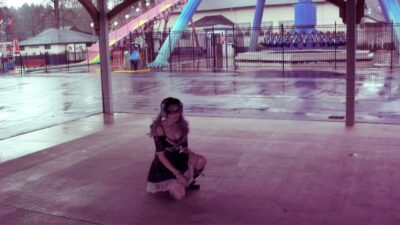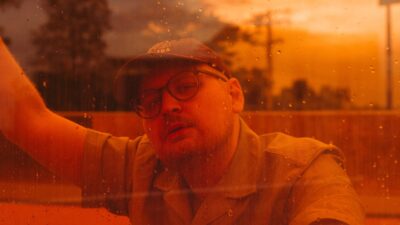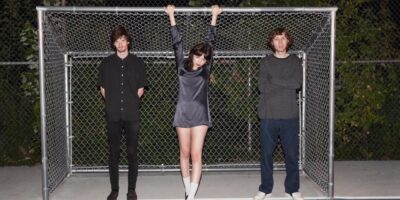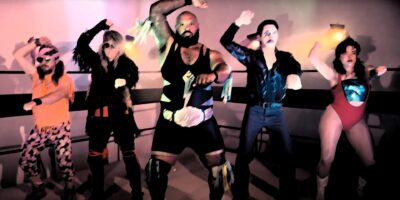Dazy, the musical project of Richmond, VA’s James Goodson, specializes in turbo-charged, gauzy power pop music. Goodson draws from the hook-centric speed-pop songwriting of Green Day, Nirvana, and The Ramones, but filters it through a souped-up shoegaze chasse, adding MBV, JAMC, and the usual suspects to the pool of influences and creating a truly supercharged sound. The title of their EVERYTHING WENT BLACK-esque 2021 compilation says it all: MAXIMUMBLASTSUPERLOUD: THE FIRST 24 SONGS. Only Lame-O labelmate Mo Troper could rival making 20-something song records that clock in at under an hour. Recently, Dazy linked up with Bay Area hardcore futurists Militarie Gun to release “Pressure Cooker”—one of the best songs of 2022 so far. On the advent of Dazy’s new debut full length studio album OUTOFBODY, I sat down with Goodson to talk about pointing towards the future of power pop while also charting the evolution of pop nostalgia as millennials age into our 30s.
Just so you know, I’m strapped to a machine right now that’s going to electrocute me if I even dare mention The Jesus and Mary Chain. I can’t say their name!!
James Goodson: I’ve never been strapped to such a machine. I probably should be.
They’re a frequent sonic reference point in many a Dazy review and interview. One thing that I’m interested in is comparing this debut full length album to your last record, THE FIRST 24 SONGS. Those songs were kind of an odds ‘n sods collection of singles and songs you had lying around. Now you’re about to release your debut album—are these fresh songs? Or was it more loose ends you shaped into a bigger record?
JG: It’s kind of a little bit of everything. I have a pretty big well of songs to pull from, like a demo bank. When it came time to choose what was going to go on the record. I think I was choosing from around 100 songs, and then I was also writing songs kind of up until the very last minute. I was still writing while I was recording what was going to end up on the record, and some of those songs wound up on there too. There are songs that are from three or four years ago, and then there are songs that were written the week the final recordings were done. It spans a distance, y’know?
I can respect it! Some writers rely on constantly building and refining… sometimes it can take years. Look at Rivers Cuomo, or someone like that. Sometimes he’s digging up songs from like 1993 and sticking a new bridge on it and releasing it.
JG: I’ll definitely do a little of that. I’d like, dig back into the song bank and find something that I’d have written off, and then I’ll hear it again with fresh ears and I’ll think it’s cool and change some things around to better suit it. I’m always kind of tinkering up until the eleventh hour, for sure.
On this album you’re refining and defining your sound. Sonic-wise, Dazy’s coming into this lane of bands like PHONY, or Pendant, or snow ellet, who are kind of taking power pop or pop punk, or even traditional pop song structures, and drawing from a more current pool of shoegaze and electronic and hip hop influences in the production choices. You’ve talked in interviews a lot about how you’re influenced by—and actively trying to write songs in the vein of—fundamental rock bands like Oasis and Nirvana and Green Day and The Ramones. Can you speak on including samples and more electronic and shoegaze type production techniques? I think that’s really interesting considering power pop is obviously seen as more of a traditionalist genre usually.
JG: I would leave it up to genre scholars to know whether or not I was doing power pop, because people get pretty specific about it sometimes. To me, the power pop stuff that I really like the most—and that sticks with me the most—is the stuff that just crosses over into fundamentally big sounding hooky noisey rock music. I definitely love power pop, and go pretty deep on it for sure, but I think part of what I like about a lot of the bands you mentioned—and power pop music in general, and whatever you would broadly define as alternative rock—is that it has a connection to subculture and underground stuff, and it’s sort of this bridge between really big accessible satisfying songwriting and the weirdness that comes with something being tied to subculture and being a little under the radar, or whatever.
Other than just how old I am and where those decades fell for me as a human I think that’s why the 80s and 90s broadly, and those particular points in time, are so interesting. Because a lot of music that was genuinely kind of interesting, or off the beaten path, was still getting big and accessible. There was that crossover happening. It was like this sweet spot where things could be weird but also be huge, and they could be noisey and kind of raw but also broad and catchy and cool. It’s what I try to return to in a lot of what influences me to write songs.
That’s a really good point. Power pop is a reflexively nostalgic genre, and it’s also sometimes reactionary, in some ways. I think you’re onto something. Perhaps the next evolution of power pop is drawing from more contemporary sources. I think of Dazy as forward thinking power pop music. Power pop is reflective of a nostalgic view on songwriting. When you think of 90s power pop, some of it was incorporating a shoegaze influence like Teenage Fanclub.
JG: Yeah, sure. I feel like Superdrag had some shoegaze-y stuff going on.
Right, and that stuff and Madchester was influenced by 60s psych, stuff that was around when shoegazers were little kids or just being born. Shoegaze was their mirror version of psych music. For us, that’s the late 80s and early 90s. There was Primal Scream and The Primitives, there’s precedent for it.
JG: I think that’s part of what makes that kind of music—and that kind of lineage—so fun and interesting. And I guess ultimately what makes it really satisfying is that it does have this element that’s pulling from all these different decades. Essentially, people keep making satisfying pop music and building and building and building on this idea of taking crunchy loud guitars and melding them with great melodies. It’s just a great thing that doesn’t go away.
It’s evergreen, it never loses its flavor or anything. Less charitably, you could say it’s a copy of a copy of a copy, but really I think it’s about getting something down to its basics.
JG: I think that’s a good way to put it. To be honest—and maybe I just say this because my music is pretty easy to spot the influences in—but I don’t necessarily think the “copy of a copy” thing always is bad.
Not at all!
JG: A lot of times it ends up making really cool things because it is just sort of filtering something through a new factor or element. Like, the new person doing it is always going to inadvertently add something, and that kind of filtering can end up making something really special, or even new, or just interesting in some way while still retaining something that’s so primal and fundamental and really good. I also say this as somebody whose artwork is literally Xeroxing copies of Xeroxes over and over. I truly see “copy of a copy” as a good way to do it.
Oh yeah. I agree! I’m glad you’re bringing this up too, because it’s something that I always think about when I listen to Dazy. That kind of influence telephone game gets lost in the shuffle. One reference point that you always point towards that I feel not a lot of modern bands clock as much anymore is your love for The Ramones. The Ramones were the ultimate in doing that. It’s like reduction but also creating something new, almost like compressing a rock until it’s diamond. That’s kind of what The Ramones are. The Ramones were always upfront about their own influences—it’s all 60s bubblegum and Phil Spector, but super loud and fast and extremely primal versions of that style. I think there’s a lineage there. You’re taking basic, fundamental, foundational rock bands that everyone gets into when they’re in high school—taking those sounds and recontextualizing them through several decades worth of guitar-pop music.
JG: I don’t know how much of that I was fully conscious of when I was conceptualizing what kind of songs I was trying to make, but I do think there was an element of thinking back on this music that I really loved as a kid, and stuff that had stood the test of time not only in general but for me, like stuff I still listen to, to this day. I had it in the back of my head, like, “I wanna do that.” Not even meaning I’m trying to make music that stands the test of time for everyone—I would love that, that would be amazing, but mostly I just want to stand the test of time for me. Trying to tap into these things you’ve loved for your entire life—maybe that’s the music that you’ll love to make the most. That really has been true for me: digging right into the source and the stuff that’s moved me my whole life has been something I’ve found to be really satisfying to make.
That’s a great sentiment, and that is coincidentally how I’ve always thought Noel Gallagher writes songs. Oasis is another band that does that exact same thing: Noel figured out a way to filter 25 years of British guitar music into a unified sound. That’s the Oasis sound when you really break it down—people will always point out The Beatles, or when they’re ripping off Motown, or whatever.
JG: They’ll say like “Oh, The Beatles and The Sex Pistols is the formula,” or whatever.
Right! It’s like The Beatles, and The Sex Pistols, and early Creation records, and Primal Scream, but also Stone Roses and The Smiths—all in a fucking blender. They formed at the peak of first wave shoegaze.
JG: I think that’s something that was always cool about the way Oasis and those kinds of bands would talk about their influences. People would kind of give them a hard time about their obvious Beatles influences, and I always liked that they just really owned it, like “Yeah, I really fucking love The Beatles!” I try to carry that with me. You don’t gotta be too cute about your influences, you can just say the stuff that you like. Even when you were talking about The Jesus and Mary Chain or whatever, I’m definitely obsessed with that band, and they’re so essential to the DNA of what I do. I would never try to be like, “I don’t know about that…” y’know what I mean? Any of that stuff—Green Day, Nirvana—these bands are the first bands that I ever heard in my life and that I connected to.
They’re fundamental FOR A REASON!
JG: Yeah, exactly!
I feel the exact same way. I feel like people fall into the trap of wanting to be “Cool” or whatever, but what they fail to remember is that EVERYONE gets into these bands when they first get into bands. You shouldn’t be gatekeeping that—who cares?! Everyone gets into the exact same pool of bands when they’re 11 or 12 years old.
JG: It’s like a really cool thing, actually! And not a lame thing! It’s a fun commonality.
Green Day and Nirvana and Oasis and The Strokes fandom being an evergreen thing that’s been shared culturally between generations is actually pretty cool. It’s one weird facet of monoculture that has actually benefited the music industry in some respect. It’s also fascinating to consider how even those bands break down their own influences. With Green Day, they really take great pains in interviews—Billie Joe especially—talking about how influenced by The Replacements and Hüsker Dü they are. Really when you think about it, the Rosetta Stone to the classic 90s Green Day sound is that it’s The ‘Mats and Hüsker Dü, but with a more overt The Ramones and The Beatles influence.
JG: That’s a thing that I always really loved as a kid, and even now. Bands that when you got into them you can use them as a pivot point to get into other things. Like you’re saying about Green Day, you can get into Hüsker Dü, you can get into The Replacements, you can get into The Who, or whatever. Oasis, you can get into all these different bands. Nirvana would open up the door to SST Records, and stuff like that.
I’ve gotten into SO much shit through Nirvana! Such a deep rabbit hole—especially if you go into Kurt’s list of favorite records that he wrote out. All of those are incredible records.
JG: And the songs that they would cover! How many people got into The Vaselines because they covered The Vaselines?
I was about to say! When I was getting into Nirvana, my favorite Nirvana stuff was always the Vaselines covers, or their goofy two chord punk songs. That stuff sounds more like Green Day than most bands who say they’re influenced by Green Day.
JG: There’s definitely some pretty common lines between a Green Day song and, say, “Sliver.”
Yeah! And that’s my favorite Nirvana song. So much of that 90s rock sound relies on that Pixies loud/quiet/loud dynamic—and that includes Green Day since they were one of the first major post-Nirvana bands. If you have those dynamics in your verse/chorus/verse structure…
JG: …it’s gonna hit!
On a very base level, that’s just how you write a 90s rock song. You can then slot that into whatever subgenre you want, as long as the verse is quiet and the chorus is super loud and hooky. Essentially, that’s how to write a power pop song.
JG: You start to catch onto those things, and sometimes when you’re writing songs you almost have this instinct to avoid such an obvious songwriting trick. I think that’s something I kind of dig about power pop, or a lot of those very elemental rock bands is the way they lean right into it—into the most direct, most satisfying, most boiled down version of it. Because they’re trying to get to that hook and give you that sweetness that you want and not trying to out-think it. I love that about it.
It’s cool to me when you wear your influences on your sleeve and are open about it. Coming at it from that direction and ending up with something that sounds the way OUTOFBODY sounds, in some ways this is the Green Day album I wish they’d make right now. A lot of those foundational rock bands—if they’re still around, and Green Day especially—are just making new music that’s just… I mean talk about a “copy of a copy of a copy!” It’s just chasing some kind of former glory in some capacity. I think it would be really cool if Green Day just sounded like Japanese Breakfast or something now. Thankfully, we’ve got these Dazy records that actually do sound like that, and I think you would take it as a compliment if someone told you that.
JG: Sure, yeah. I’ve definitely never thought about it in terms of “Let me write the version of what I wish a band would be doing,” it’s just, “what is it exactly that I want to hear?” A lot of Dazy songs have come from “wouldn’t it be cool if this band and this band did a thing together?” You end up with stuff like you’re talking about before, where there’s like drum machines and loops and things like that.
It’s almost taking the same approach as sampling or mashup culture. I think all of that is totally fair game, especially now. We’re in this era where part of the reason why so many pop songs—like Top 40, major label, mainstream pop songs—have like 16 writers on each track is because everyone’s afraid of getting sued by some estate that holds the rights to some fuckin’ jingle from 1962, or something.
JG: You can only come up with so many chord progressions.
Really, when you think about it, that’s just what songwriting is. That’s songwriting in the folk music tradition at its purest, dating back to Harry Smith and Old Weird America.
JG: To your point about sampling and mashups, pulling from different things: another thing I think is appealing about a lot of those 80s and 90s bands is that they have this fearlessness to incorporate stuff that’s modern and then also stuff that’s very classic. There’s a lot of combining. I always get a kick out of the late 90s, when electronic music was getting big and a lot of guitar bands were incorporating more electronic stuff into their songs. I think that was such a cool time. And maybe that’s being fueled by people being fascinated with technology, maybe they were chasing a trend, whatever it is. Divorced of the time and looking back on it, now all I can see is how cool some of that music is. There’s this sort of willingness to jam certain sounds together and not worry about how you got there. There’s digital meeting organic. People are not really sweating whether it’s a particularly vintage amp or a computer being used.
It’s funny to think of now, because we’re in an era now… we’re kind of in a post-sellout era. The concept of selling out doesn’t really exist in 2022. That kind of almost frees you up, because your approach can just be whatever. Everything is so stratified and niche already, you can kind of just see how deep the pool of your niche even is. It is really interesting to revisit music from 25 years ago, music from the 90s now as a listener—and as a consumer.
When I was a kid growing up with Sugar Ray singles, I didn’t know they were a major label artist at the time, or that they had to use electronic samples and drums probably because their record label told them to to make it more marketable for commercials and advertisements. I don’t know how intrinsic it was to their artistic statement as a band. Obviously I could interview Mark McGrath and get the real story, but in any case, all I’m saying is that it could have been prefabricated that they were using that setup for those songs. Ultimately, though, I’ve come full circle in the last 30 years, from loving those songs when I was a kid, to distancing myself from them when I was in middle school and high school because it “wasn’t cool” anymore, to now being a fully grown adult in my 30s who thinks those are just good pop songs, man. People are making music like this now that is nostalgic because they remember what that sounded like when they were kids, but also now with technology everyone has the means to make music that sounds like that in their bedroom.
JG: Totally—and it gets re-appreciated in a new way!
You don’t need a five million dollar advance like Sugar Ray got. Now everyone is just approaching that music from a completely earnest standpoint, on the level of Art. I think that’s kind of beautiful.
JG: It’s the cool thing about music in general—the way time so drastically changes the way people absorb it. It can change your appreciation of it. Sugar Ray is a great example; I definitely remember those songs being on the radio all the time, and at a certain point being like “This rocks!” and then later thinking maybe thinking “This is kind of annoying!” But I did swing back around to “This is awesome!” eventually. There’s stuff you hear when you’re a kid—I remember being at a friend’s house and listening to “Champagne Supernova” and getting such a kick out of it because it’s a long song and these guys had these cool accents and the title was funny. When you’re a little kid, that’s what you enjoy about it.
And you can stand to listen to a seven minute long song!
JG: As an adult, you get to enjoy these other different facets of it. Like, “Oh, cool, I can see where they’re pulling from.” All these different influences and things to appreciate about it later.
“Ooh, do I detect a little XTC or late period The Jam??”
JG: I think that’s just a really cool, fun thing about music! How time shapes everything and changes everything. If your band sticks around long enough, you can go through all these cool ups and downs. It’s something to keep in mind, how the perspectives change.
Absolutely. I think part of that, too—especially in the 90s—was that contextually a lot of those A&R people at labels at the time came from a college radio background in the 80s, and they were into The Replacements, and Hüsker Dü, and R.E.M., and all of these college rock bands and 80s indie rock bands. That carries over into the 90s radio pop stuff—a lot of it has this super college bent. That contextually gets lost in the shuffle a little bit, I think. It just kind of turns into “What 90s Music Sounds Like.” There’s a reason 90s music sounds like that! As you were saying, breaking it down and breaking down the influences—from Rivers Cuomo on down, some writers will develop it into almost a formula. And it takes a certain type of songwriter to be able to piece that stuff together. Even if you’re treating a song like a math equation, ultimately it comes down to the structure of the song and how people respond to it.
JG: Who’s doing the math, I guess? You’re totally right. It’s like, R.E.M. doesn’t really sound anything like Nirvana, but these are quintessential alternative rock bands. If I’m writing a song and the exercise in my head is “Kurt Cobain and Michael Stipe are writing a song together” I kind of answer to that songwriting math equation. It might be totally different from somebody else’s. Some of that specialness comes in, like no matter how open you are about your influences or how high they are up on your sleeves, everyone’s approach is going to be different and unique.
Another full circle thing, really, is that we’ve got the blink reunion that everyone is talking about and excited about. I feel like in the last decade, and especially the last five years, blink has become an especially influential artist in a pangenre or even monogenre way. Most mainstream pop right now seems influenced by blink-182 in a pretty direct way. That’s pretty crazy to think about when we’re not even 20 years past the anniversary of AMERICAN IDIOT. When blink broke up the first time, it preceded Green Day imminently becoming the biggest band in the world again, for a second time—ten years after DOOKIE—which still seems kind of unprecedented. I feel like that kind of gave way to… AMERICAN IDIOT begat THE BLACK PARADE, and then it just begat the Broadway musical version I guess. I don’t really feel like AMERICAN IDIOT as an influence carried over across decades. blink kind of just leapfrogged them again.
JG: You’re right. It’s hard to tell where certain bands sit in the zeitgeist, I guess. Sometimes it’s really obvious and sometimes it’s not.
These are still two absolutely gigantic bands. I mean, they’re both headlining When We Were Young festival. It’s going to be like the Pop Disaster Tour 20 years later.
JG: For sure. I think part of it is that everything does get its day in the sun and comes back around. That’s part of what’s cool to see as you get a little older. Things go in these 20 year cycles. I don’t feel like it was that long ago when there was major 80s nostalgia, and now we’ve got 90s nostalgia happening. We’re seeing the Y2K era sneaking in. I feel like there’s a cynical way to look at that, but for the most part I get a kick out of it and I think it does generate new and interesting stuff, and people take it and run with it and go where they’re gonna go. It’s part of the fun. It’s like we were saying before—all this shit is in the lineage of something else. That’s what I think is cool about whatever you would call pop music. It is this hand-me-down, person-to-person thing that wouldn’t be what it is without that looking backwards element.
That’s the real, human element, ultimately. I think it bears out! This is another great record full of great songs, and I’m really stoked about what’s next for you. I just have one final question… Who is your favorite Ramone?
JG: Oof. Alright, man. This is a hard question. I think I wanna say Dee Dee. I’ve been on a real Dee Dee kick lately. I really appreciate him as the behind the scenes songwriter of a lot of their songs.
You can respect Dee Dee on a pure songwriting level.
JG: He’s also—out of a bunch of guys who look really cool, he’s probably the coolest looking.
He was a cutie!
JG: Yeah, and like, I recently got really into his crazy solo album—the Dee Dee King record.
The Dee Dee King record is crazy if you’re into white guys rapping in the 80s like I am.
JG: It’s reputation is that it’s this horrible unlistenable thing, but if you like The Ramones and can go deeper into 80s and 90s Ramones anyway, there’s shit on that Dee Dee King record that is really fun. I just think he’s such an enduring character. But I love ‘em all! How could you choose? Great guys.
An absolute unit!
You can listen to and buy OUTOFBODY over on Bandcamp!
















Comments